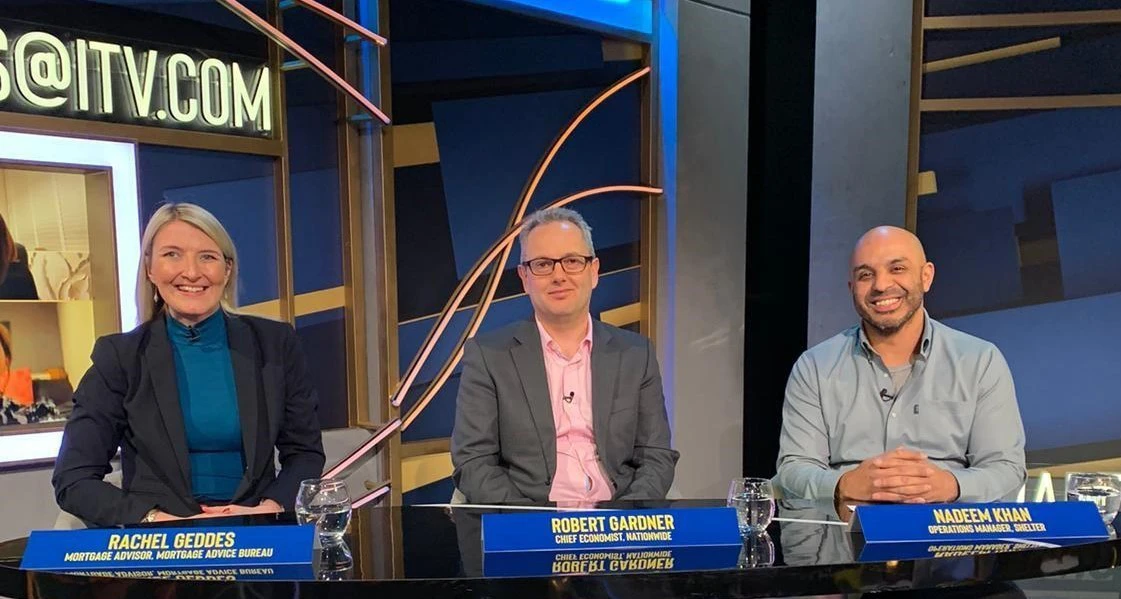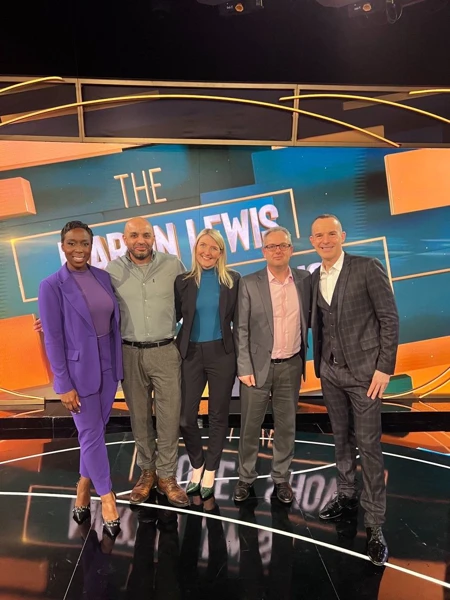Rachel, Business Principal, Mortgage Advice Bureau - City of London, featured on a specialist panel dedicated to housing. She was joined by Robert Gardner, Chief Economist at Nationwide, and Nadeem Khan, Operations Manager at housing and homelessness charity, Shelter.
How the show unfolded
The mortgage-related questions began with an inquiry from a viewer who was ready to buy, but wanted to know whether or not mortgage rates were likely to fall in Q1 2024 before making a decision. Martin explained the UK base rate performance, and the price differences of a range of mortgage products in relation to the base rate.
Onto the main attraction: the questions from viewers. This was a great chance for Rachel to showcase her expertise and insights, so we’ve put together a brief summary so you can catch up on the action:
Getting the right mortgage deal
Q: “I’m working as a care assistant in Edinburgh and my annual income is £29,000. Can you please tell me what the right mortgage deal is for me and where to find it?”
Rachel: “There are lots of variables to consider, but usually lenders are looking at around 4-4.5x income multiples. That will give you a good gauge of what’s possible.”
In response to a question from a viewer on how important it is to build credit in your early 20s, Martin highlighted the significance of a good credit score and history in order to boost your chances for mortgage acceptance.
To support his point, he highlighted the fact that mortgage brokers can access acceptance criteria that the public can’t - so it’s well worth speaking to one to get expert advice.
Martin added: “Mortgage brokers know stuff that we can’t get. I would try and use a mortgage broker if you can, especially if you’ve got complex scenarios like if you’re self-employed, living above a shop, or have cladding. Some deals and some firms are only available through mortgage brokers, including product transfers and existing customer deals.”
Q: “My fixed rate ends in six months. The rate I’ve been offered will cost me £200 more or so a month with my existing lender. Should I fix?”
Rachel: “Look at what your current lender is doing, and what other lenders can do for you now as well. It’s worth shopping around.”
This was followed by another push from Martin to speak to a mortgage broker to get tailored advice and help for your specific circumstances.
Shared Ownership - is it right for you?
Next, onto the topic of Shared Ownership.
Q: Please can you explain the pros and cons of Shared Ownership purchasing? I am a first time buyer with a deposit of £15,000.
Rachel explained that Shared Ownership has some great benefits, such as getting a bigger property (sometimes in a preferred area).
“It works by paying a mortgage and then renting on a proportionate amount,” she said. “You can staircase, so you get to the point where you own the property, in full, over a period of time. The cons are that you’re paying your mortgage and you’re [also] paying rent.

“When it comes to selling, if you own all of the property, you may be restricted in terms of who you can sell it to and who you have to sell it through. You may also find the rates you are being offered are slightly different, as they have to be through the Shared Ownership scheme."
Viewers’ miscellaneous questions
Q: Mine and my partner’s current mortgage deal ends in May. My partner went to a limited company last July, so doesn’t quite have two years worth of books. Help!
Rachel: “The average that most lenders want is two years’ accounts. However, there are lots of lenders out there that would consider one years’ accounts, so speak to somebody - you might not have to stay with your current lender.”
Martin followed up on Rachel’s guidance: “If you’ve got extraordinary circumstances, that’s when a broker can be really helpful - this is a time to go to a mortgage broker.”
Q: We’re coming to the end of paying off our mortgage in April 2024, but still owe £96,000. I’m 62 years old (my wife is 58), it’s hard to find a lender who will offer competitive rates. Can you help?
Rachel: “Most lenders will allow you to take your mortgage to ages 70-75 quite comfortably. Beyond that, it comes down to pension income. For some lenders, there is no upper age limit at all. Age doesn’t hinder you - it’s about what your reserves are, and also what you’re looking to do.”
If you missed Rachel on The Martin Lewis Money Show, you can catch up on ITV X here.
As Martin reiterated, the importance of mortgage advice cannot be understated. If you have any questions about your mortgage - no matter what stage of the homebuying journey you are at - our expert advisers would love to hear from you.
Get in touch with us today for a free, no obligation conversation and see how we can help you get mortgage ready.
Important information
Your home may be repossessed if you do not keep up repayments on your mortgage.
There may be a fee for mortgage advice. The actual amount you pay will depend on your circumstances. The fee is up to 1% but a typical fee is 0.3% of the amount borrowed.
You may have to pay an early repayment charge to your existing lender if you remortgage.




